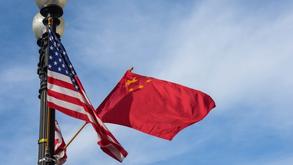 An undated photo shows the national flags of China (right) and the United States on Constitution Avenue in Washington, capital of the United States. (PHOTO / XINHUA)
An undated photo shows the national flags of China (right) and the United States on Constitution Avenue in Washington, capital of the United States. (PHOTO / XINHUA)
US Treasury Secretary Janet Yellen's scheduled visit to China signals that the world's two largest economies are trying to strengthen regular dialogue, potentially laying the foundation for a substantive ease in bilateral economic tensions, political advisers and experts said on Monday.
The spillover risks of the United States' piling up of national debt and US sanctions on Chinese tech companies are among the main areas of concern on which Chinese officials are expected to declare their standpoint during the dialogue with Yellen, they said.
The US treasury secretary is scheduled to visit China from Thursday through Sunday, according to China's Ministry of Finance. Her visit comes close on the heels of US Secretary of State Antony Blinken's trip last month.
"After Blinken's visit paved the way for more high-level China-US exchanges, Yellen's trip indicates that the two countries are resuming regular channels of communication, conveying their mutual intention to move forward and ease the tense situation," said Zhang Xiaotao, dean of the School of International Trade and Economics at Central University of Finance and Economics.
Yellen's long-awaited visit comes as China-US economic ties remain plagued by broader geopolitical tensions and disputes in multiple areas, such as semiconductor technology, supply chains and debt issues, raising hopes that her visit may help settle some of the differences.
While in Beijing, US Treasury Secretary Janet Yellen plans to discuss with Chinese officials the importance of the two countries responsibly managing their relationship, communicating directly about areas of concern and working together to address global challenges, according to the US Department of the Treasury
Senior financial officials of China and the US can express their views and opinions more clearly during their face-to-face conversations, said Wen Laicheng, an expert at the finance ministry's China Government Debt Center and a professor at Central University of Finance and Economics. "The visit, from this perspective, is highly important and positive," Wen added.
While in Beijing, Yellen plans to discuss with Chinese officials the importance of the two countries responsibly managing their relationship, communicating directly about areas of concern and working together to address global challenges, according to the US Department of the Treasury.
ALSO READ: US treasury secretary to visit China from July 6 to 9
Zhang Lianqi, a member of the Standing Committee of the 14th National Committee of the Chinese People's Political Consultative Conference, the country's top political advisory body, said that US suppression of China's semiconductor and other industries is expected to be the key topic of discussion.
Chinese officials may also express their concerns over the spillover risks of climbing US debt after the suspension of the US government's $31.4 trillion debt ceiling, Zhang said.
Experts cautioned that it is unlikely that a single visit by a senior US financial official would achieve substantial progress in resolving the deeply rooted disagreements between the two sides, especially when the US has adopted a "de-risking" strategy to cover for the fragmentation of supply chains, which is proving to be costly for the world.
Although Yellen has called the notion of an economic "decoupling" from China "disastrous", she is still expected to emphasize the strategy of "de-risking" and insist on the concept of economic competition, Zhang said.
READ MORE: Experts: Time for US to build on goodwill
"On the one hand, the US hopes to communicate with China and gain China's support, but on the other, it continues to intensify trade actions against China, such as adding Chinese companies to its entity list for sanctions and making other countries block China in terms of technology product export," said Wen of Central University of Finance and Economics. "There is no sign of improvement in this regard."


